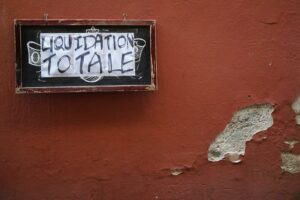Navigating a company through financial difficulties is a demanding ordeal for any manager. In addition to the operational and economic challenges, particular attention must be paid to the personal responsibilities that may be incurred. In the event of receivership or, more frequently, compulsory liquidation, managers may find themselves exposed to a range of sanctions if they are at fault in the management of the company or in the conduct of the proceedings. Knowing these risks is essential if you are to anticipate and, if possible, avoid potentially serious consequences. This article provides an overview of the three main categories of sanctions: financial, professional and criminal. Each of these categories is the subject of more in-depth analyses in dedicated articles on our blog.
Asset sanctions: when personal assets are at stake
The main fear of many directors is that their personal assets will be used to cover the company's debts. This fear is mainly linked to the action for liability for insufficient assets. Formerly known as the "action en comblement de passif" (action to cover liabilities), this allows the court, only in the event of compulsory liquidation, to order a director (de jure or de facto) to pay all or part of the company's debts that cannot be repaid from the remaining assets..
For this liability to be incurred, three conditions must be met: a shortfall in assets, one or more management errors committed by the director, and a causal link proving that these errors contributed to the shortfall in assets.. The concept of mismanagement is broad and left to the discretion of judges, but the law specifies that "simple negligence" is not sufficient to engage the liability of the director.. If liability is found, the judge has broad powers to set the amount of the penalty, within the limit of the shortfall in assets.. The sums recovered in this way are distributed among all the creditors, without taking into account any liens..
Mention should also be made of a more specific type of liability, linked to environmental issues, which may result in a parent company being held responsible for part of the financing of measures to restore a site operated by its subsidiary in liquidation, if the parent company's gross negligence has contributed to the subsidiary's lack of assets..
For a detailed analysis of the conditions and consequences of this action, see our article on liability for insufficient assets.
Professional sanctions: prohibition from practising
In addition to the financial consequences, a company's difficulties may lead to sanctions aimed at preventing the offending director from continuing to direct or manage the company. These sanctions, known as professional sanctions, are mainly personal bankruptcy and a ban on managing the business.. Pronounced by the civil or commercial court during receivership or compulsory liquidation proceedingsThey are "punitive" in nature and are designed to clean up business life.. They are never automatic, the judge deciding whether to impose them depending on the seriousness of the offence..
Personal bankruptcy is the most severe sanction. It entails a general ban on exercising any function of management, administration, management or control of a company or legal entity.. It may also result in related disabilities, such as the inability to hold an elected public office.. The cases that can lead to personal bankruptcy are varied and exhaustively listed by law. They include, in particular, carrying on an activity despite a banthe use of ruinous meansmisappropriation or concealment of assetsfraudulent increase in liabilitiesor serious accounting irregularities.
A ban on managing the business is a more flexible sanction, often imposed as an alternative to personal bankruptcy.. The court may target the ban on certain specific activities or functions. It can be imposed for the same reasons as personal bankruptcyIn addition, there are specific breaches, such as "knowingly" failing to declare the cessation of payments within the legal time limit..
These two penalties are temporary, their duration being set by the court up to a maximum of fifteen years.. An early recovery procedure (rehabilitation) is possible under certain conditions.
Explore the specific cases, the effects and the possibilities for rehabilitation in our article dedicated to personal bankruptcy and a management ban.
Criminal sanctions: bankruptcy and related offences
The most repressive aspect concerns criminal sanctions, the main offence of which is bankruptcy.. Unlike the previous penalties, bankruptcy is an offence tried by the criminal courts.. It can only be identified in the event of the opening of receivership or compulsory liquidation proceedings. and is designed to punish serious fraudulent behaviour that took place before or after the cessation of payments.
Acts constituting bankruptcy are defined in article L. 654-2 of the French Commercial Code and include:
- Having used ruinous means (purchases for resale at a loss, excessive borrowing, bills of exchange, etc.) to avoid or delay the opening of proceedings.
- Embezzling or concealing all or part of the debtor's assets.
- Fraudulently increasing the debtor's liabilities.
- Keeping fictitious accounts, causing accounting documents to disappear or failing to keep all mandatory accounts.
- Keeping accounts that are manifestly incomplete or irregular.
The persons who can be prosecuted are the same as for professional sanctions (debtors who are natural persons, de jure or de facto directors, permanent representatives).. Legal persons may also be held criminally liable. The penalties for bankruptcy are severe: up to five years' imprisonment and a fine of €75,000 for individuals (or even more for certain specific managers).and substantial fines and other penalties for legal persons. Aiding and abetting is also punishable.
In addition to bankruptcy, there are other criminal offences, often referred to as "related offences".These include, for example, the sanctioning of irregular acts of disposal during the procedure.misuse of procedural bodiesor the debtor's fraudulent organisation of his insolvency.
Our article on bankruptcy and related offences details these criminal offences and their consequences.
Finally, it is essential to be familiar with the specific procedural rules governing these various sanction actions, as well as the possible avenues of appeal. These aspects are covered in our guide to sanctions procedures and appeals.
For a personalised analysis of your situation and the potential risks to which you could be exposed as a manager, our team is at your disposal to offer you a comprehensive and detailed analysis of your situation. dedicated legal assistance.
Frequently asked questions
What are the 3 main categories of penalty for a company director in difficulty?
The three main categories are asset sanctions (such as liability for insufficiency of assets)professional sanctions (personal bankruptcy, management ban) and criminal sanctions (mainly bankruptcy).
What is liability for insufficient assets?
This is an action that can oblige an offending director, in the event of compulsory liquidation, to pay out of his or her personal assets all or part of the company's debts that cannot be covered by the company's assets..
Are my personal assets automatically involved if my company goes into receivership?
No, liability for personal assets is not automatic. It is necessary to prove that the company director was at fault in his management and contributed to the shortfall in assets before he can be held liable..
What is a "management error"?
There is no precise legal definition; it is a fault committed in the administration of the company, by action or omission, assessed by the judges.. This may include continuing a loss-making business in an abusive manner, accounting irregularities or failure to comply with legal obligations..
What is the difference between personal bankruptcy and a management ban?
Personal bankruptcy is a general ban on exercising any management functionA management ban is more targeted and can be limited to certain activities or functions, and is often imposed as a less severe alternative..
What types of behaviour can lead to personal bankruptcy?
A number of serious behaviours are targeted, such as misappropriation of assets, use of ruinous means to delay proceedings, major accounting irregularities, or carrying on business despite a ban..
How long can personal bankruptcy or a management ban last?
The term is set by the court imposing the penalty and may not exceed fifteen years..
What is the offence of bankruptcy?
This is the main criminal offence relating to business difficulties, punishing serious fraudulent acts (misappropriation of assets, fictitious accounting, etc.) committed in the context of receivership or compulsory liquidation..
Does bankruptcy only apply to managers?
No, if the directors (de jure or de facto) are the main targetsHowever, other people can also be sued, such as debtors who are natural persons (shopkeepers, tradesmen, etc.). or even accomplices (bankers, accountants...). Legal persons may also be declared criminally liable.
Can a simple management error be considered bankruptcy?
No, bankruptcy is an intentional offence that requires serious fraudulent acts. Mere error or negligence, if it has caused damage, is more likely to result in civil or professional penalties, and even then, simple negligence is often excluded.




